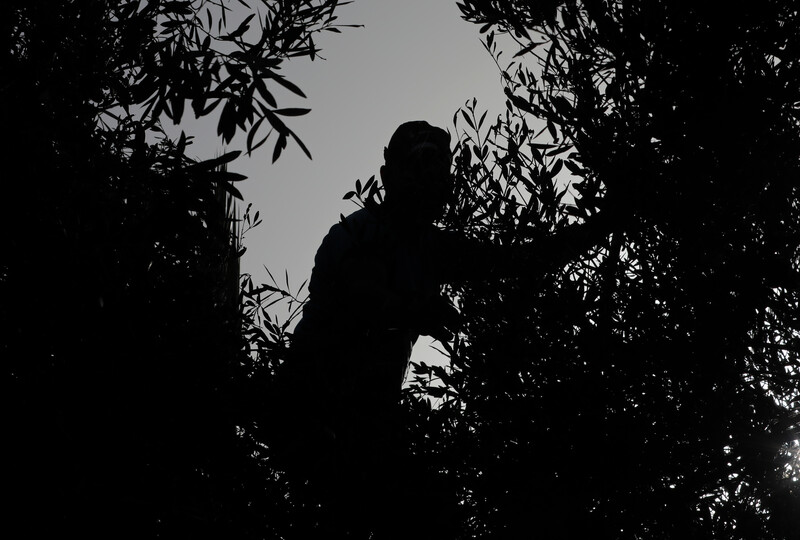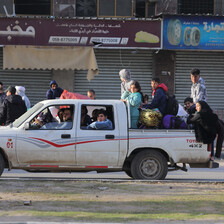The Electronic Intifada 29 November 2023

Palestinians pick olives from trees in Zawaida in the central Gaza Strip, 28 November 2023. (Omar Ashtawy / APA Images)
The other week, I went to bed early to try and get a restful night’s sleep. However, in the middle of the night, I was awakened by a nightmare of an airstrike.
Startled, I leapt out of bed and found myself unable to go back to sleep. I was anxiously moving around in bed, my mind preoccupied, when I heard the deafening sound of a nearby airstrike.
The impact shook the area close to the building where I am now living.
In the morning, the rain began to fall and temperatures dropped. My sister received a call from her friend, who asked if she had any clothes suitable for children in the first and second grades, as my 7-year-old nephew Yazan is in the second grade.
My sister apologized that she had already given them away to other children.
My mother and I had a conversation on how we feel guilty. I feel guilty for having money, for having food, for having a roof over my head and also for having enough clothes to wear.
Relatives of my sister’s husband paid us a visit. They brought us rice and milk pudding.
This was our first dessert since the beginning of the war. They were prepared over an open fire, giving them a distinct smoky flavor.
Hiba, one of the relatives, shared the devastating news that her family had been attacked along with their neighbors.
I reached out to my brother, who works as a nurse, seeking to connect and share updates, but the lines were down. He told me earlier that his shifts at the hospital are now 48 hours on, 48 hours off.
Meanwhile, my uncle, his four sons (three of them are married) and his four unmarried daughters have sought refuge in a nearby school run by the UN agency for Palestine refugees (UNRWA) in the Sheikh Radwan neighborhood, north of Gaza City’s Beach refugee camp.
Due to the cold weather, my cousins are using prayer rugs as blankets during the night. I tried to call my uncle again, but he did not pick up.
Victory
I had a conversation with my aunt who lives in Khan Younis, southern Gaza. Born in 1948, she recounted her experiences of various wars, including those in 1956, 1967, 1973, 2008, 2012 and 2021.
She said the current war was unlike anything she had ever witnessed. She said she wasn’t afraid to die, but that she was afraid of being erased.
She shared news of the death of a distant relative. He had left Khan Younis to go farther south after Israel’s evacuation orders.
Thinking it safe to return north, he did so, along with his wife and children, only to be killed by an Israeli attack. Another family member and his two sons were also reported missing.
I tried to contact my aunt Intisar, who resides in the al-Zaytoun neighborhood on the outskirts of Gaza City, but received no response.
Her name Intisar means “victory” in Arabic. My grandfather named her this in 1956, during the Suez crisis, when Egypt and the Gaza Strip faced an invasion by Israel, the United Kingdom and France.
I tried to call her again, but she did not pick up.
Facing annihilation
When my family and I first evacuated, we were ill-prepared and wearing summer clothes. I personally acquired a jacket in anticipation of such circumstances and wrapped myself in a blanket for additional warmth.
My sister’s resourcefulness has shone through as she has repurposed a crock pot, removing the electric cables and using wood to bake bread. She now uses the pot to cook food.
She cooked a thick tomato sauce with corned beef.
I thought this was frivolous, to cook a single dish that could well be two dishes. She ought to have cooked one dish with a single ingredient.
At lunch, we had leftover bread. Normally, my sister would divide it among her children and encourage them to eat it.
This time, however, she put it in a bag, intending to give it to them at night if they got hungry.
She expressed her disbelief at the need to ration food, remembering days when we would get pizza from a restaurant called Italiano.
Italiano is gone, as are its owners and their families, annihilated by Israel.
The two owners, both engineers unable to find work in Gaza, decided to open a pizzeria. The restaurant’s color palette was the red, white and green of the Italian flag.
This war is characterized by a series of massacres. Every time I turn on the news, I hear stories of individuals mourning the loss of their loved ones.
The following day, those very people become the subjects of mourning themselves.
It is disheartening to witness how the world focuses primarily on our struggle for basic necessities, like food and water. When a friend from the United States reached out to me, their immediate concern was if I had enough provisions.
I replied affirmatively, yet I couldn’t help but resent that our plight is reduced to mere sustenance. Why aren’t people inquiring about our well-being?
It frustrates me how people often perceive us as strong or resilient – superheroes. We are ordinary individuals with a limited capacity for endurance.
We experience vulnerability, fatigue and moments of happiness, all while the ongoing war drains us physically and mentally.
Amid all of this, my father advised my nephew to keep studying for his tawjihi exams. These exams will help determine the future course of his studies.
“The school will show no mercy,” my father warned.
These words gave me pause.
One of my brothers, who lives in the United Arab Emirates, bought an eSIM card for me. Unfortunately, it doesn’t work well in my area.
I came across a journalist on Instagram who said you could improve the eSIM card’s reception by going up on a roof or a higher floor of a building.
Regrettably, I was unable to implement this solution.
Ghada Abed is a journalist based in Gaza.



